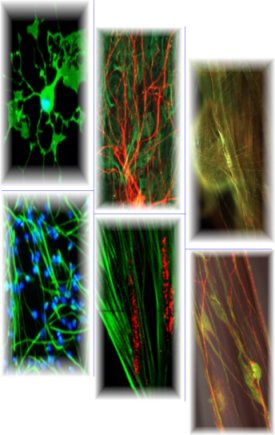|
 A critical but often overlooked objective of tissue engineering is the
development of biomaterial surfaces that specifically target a single population of cells. Many of the material surface modification schemes available today are non-specifically adhesive to a broad
range of cell types, some of which may be undesirable and may negatively impact the performance of an implanted device. Accordingly, we are developing cell-type-selective surfaces by
investigating the utility of non-extracellular matrix (ECM)-derived cell adhesion proteins that may have a more limited range of adhesive properties. For applications that target neurons in the CNS, one
well-suited candidate for such an approach is the L1 protein. The restricted pattern of L1 expression, coupled with the results of genetic and biochemical studies, strongly suggests that L1 mediates
neuron-to-neuron attachment and axonal pathfinding in the developing CNS. Together with Acorda Therapeutics Inc., we have
investigated the utility of a recombinant version of human L1 as a biologically-selective ligand for neuronal colonization. Our results indicate that L1, immobilized through a protein-resistant surface
coating, selectively promotes the attachment and outgrowth of CNS-derived neurons presented to surfaces in mixed suspensions also containing serum, primary astrocytes and primary fibroblasts. We are currently
investigating the utility of other similar molecules, both in vitro as well as on implatnted biomaterials, for application in the CNS. A critical but often overlooked objective of tissue engineering is the
development of biomaterial surfaces that specifically target a single population of cells. Many of the material surface modification schemes available today are non-specifically adhesive to a broad
range of cell types, some of which may be undesirable and may negatively impact the performance of an implanted device. Accordingly, we are developing cell-type-selective surfaces by
investigating the utility of non-extracellular matrix (ECM)-derived cell adhesion proteins that may have a more limited range of adhesive properties. For applications that target neurons in the CNS, one
well-suited candidate for such an approach is the L1 protein. The restricted pattern of L1 expression, coupled with the results of genetic and biochemical studies, strongly suggests that L1 mediates
neuron-to-neuron attachment and axonal pathfinding in the developing CNS. Together with Acorda Therapeutics Inc., we have
investigated the utility of a recombinant version of human L1 as a biologically-selective ligand for neuronal colonization. Our results indicate that L1, immobilized through a protein-resistant surface
coating, selectively promotes the attachment and outgrowth of CNS-derived neurons presented to surfaces in mixed suspensions also containing serum, primary astrocytes and primary fibroblasts. We are currently
investigating the utility of other similar molecules, both in vitro as well as on implatnted biomaterials, for application in the CNS.
|

